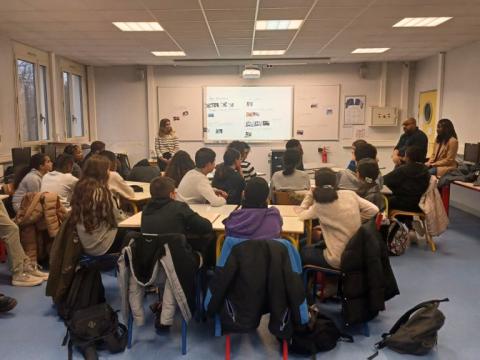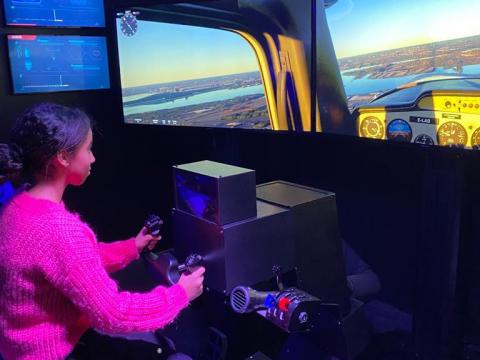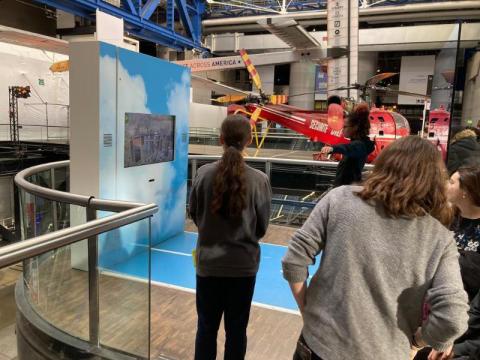
“Through the Cordées de la Réussite, young people help each other, and we facilitate these meetings.”
January 20 2023On Saturday, January 21, AgroParisTech will host National Cordées de la Réussite Day organized by Paris-Saclay University, to which the institution, as a grande école, belongs. The event will be an opportunity to find out more about this scheme, which enables middle-school and high-school students from priority neighborhoods to meet student tutors from grandes écoles under a program aimed at facilitating access to first-class higher education for these young people. Interview with Noreen Shah, project manager for Cordées de la Réussite, and Sid-Ali Alili, an intern, at AgroParisTech.
Before telling us more about the program for the National Cordées de la Réussite Day planned at AgroParisTech for the entire scheme in place at Paris-Saclay University, could you explain what the Cordées de la Réussite entails? When did the scheme start?
N.S: The Cordées de la Réussite is a national scheme, subsidized by the French government and regional authorities, which has existed for around 15 years now. Its aim, realized through an established program implemented over an academic year, is to promote equal opportunities by supporting middle-school and high-school students, fostering social and cultural openness, combating self-censorship, and breaking down the psychological barriers that can exist for students in schools belonging to the Priority Education Network (REP, REP+) as they start to think seriously about higher education. The scheme enables these young people to meet AgroParisTech students, who then become their tutors. The experience is just as enriching for the tutors. At AgroParisTech, the Cordées de la Réussite scheme has grown in scale over the years: we began with two partnerships (one middle school and one high school) and today work with 11 schools, supporting 200 pupils with around 80 tutors.

You mentioned the program. In practice, how is the scheme implemented at AgroParisTech?
N.S: The program is similar from one institution to the next and involves three types of monthly meetings between tutors and pupils from October to June.
First, through modules (meetings between pupils and tutors in dedicated areas on campus, on themes such as orientation, news, etc.). It is important to understand that this is not a form of academic tutoring! The student tutor is there to answer any questions a pupil may have regarding their academic orientation, the school, and topics in the news, but does not help the pupil with their homework, as that is not the aim of the scheme.
Second, through cultural visits, which include visits to cultural venues (the Louvre Museum, boat trips on the River Seine, Cité des Sciences, etc.) and to companies. Young people helping other young people is a win-win solution: there is not much of an age difference and they can easily understand each other, meaning that a visit to the Louvre may be perceived differently or be less boring when undertaken with other young people (smiles). We forge a link throughout an entire academic year, and what a pleasure it is to see pupils and tutors who didn’t know each other in October hug each other in June! This year, three groups are taking short trips to Berlin, Amsterdam, and Marseille.
Finally, through major events, often for the whole Paris-Saclay or ParisTech community, involving tutors, pupils and external speakers who come to present their jobs via workshops, for example. The focus here is more on guidance, as many young people initially choose the wrong course when leaving school. This is often due to lack of knowledge, self-censorship, or misconceptions about a particular profession. These events enable them to ask questions, really discover the nature of certain professions by meeting those involved, and ultimately ask themselves the question: why not me?
What are your respective roles?
N.S: Sid-Ali and I are coordinators, or “facilitators”, as we prepare the program and aim to ensure that everything runs smoothly throughout the year. We draw up the schedules, organize the visits from A to Z, and manage event logistics. We also ensure that the tutors are supported in their role, through training (provided by psychologists, sociologists, etc.). This year, I am fortunate to have Sid-Ali in my team. He is a studying for a Masters in Sociology at Évry University.
S-A.A: Yes, I am assisting Noreen with all her tasks up to the end of the academic year and I am really happy to be involved in this adventure. As part of my studies, I am also going to look carefully at the scheme’s impact on the pupils, by talking to them and to their tutors, by giving them an online questionnaire to fill in, etc., because what is really lacking at the moment is any concrete assessment of this impact.
N.S: Yes, for the first time, we plan to carry out a proper assessment of this year’s scheme. The various lockdowns helped us take a step back and review the scheme in terms of what we had been doing up until then and how we wanted to move forward with it in the future. The current information we have consists of quantitative indicators, but being able to see the amazement of pupils when they visit the rooftop vegetable garden, or the smiles on the faces of tutors at the end of a module, really makes our work meaningful and motivating.

Is it more complicated to organize these meetings now that you are based at the Palaiseau Campus?
N.S: On the contrary! Everything is here. Even from a logistical point of view, it is simpler. When we were spread out in the center of Massy, in Grignon, we worked in a kind of bubble and also communicated with our colleagues in the different institutions more remotely. I didn’t meet the student tutors every month, for example, so it is great to see them in person each time now! The campus also makes it easier to move around from one classroom or lecture hall to another. Incidentally, the last time pupils came to visit the campus, they were able to go into a lecture hall and were impressed by its size! They wanted to sit down and see what it felt like to be “grown up”. I told the tutors to leave them there for a few minutes, so that they could really get a feeling for the place. That is the best way for young people to see themselves in a role and again, to ask themselves the question: why not me?


